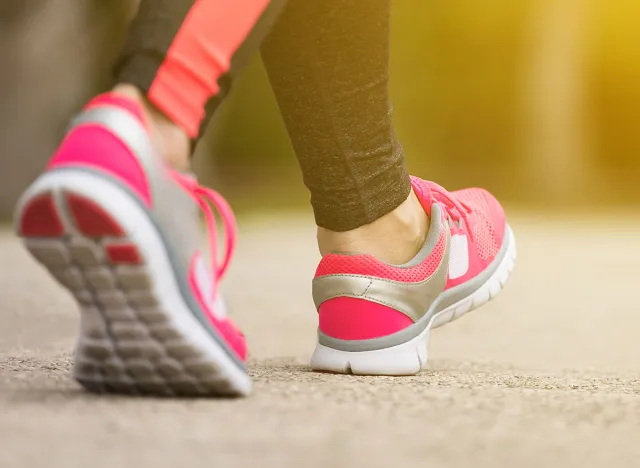Scientist Found Walking Burns Double the Fat of Running When You Follow These 3 Rules
You might have heard that walking is the best workout for weight loss. However, you might have heard the opposite. One expert is explaining everything you need to know about walking for weight loss – and if it is actually effective. Michaela, AKA Dr. Miche, PhD, is a research scientist who shares studies on weight loss, nutrition, health & fitness "to help you reach your goals!" she explains in her YouTube bio. In a new viral video, she addresses the question: Should you walk for weight loss? "Can losing weight really be as easy as just adding a few walks a week to your routine? The information out there is all over the place. As usual, I'm going to the actual scientific studies to find the answer. I'm also gonna tell you about how you can optimize the amount of fat burning you do from walking, and I bet you'll be surprised by the answer," she says.
Some Say Walking Is Great for Weight Loss, While Others Say the Opposite
"The question of whether walking is useful for weight loss is more controversial than one might expect because if you do a Google search, you'll get information strongly on both sides of the spectrum," she says in her post. "For example, you'll have blogs and news articles that say that walking is not useful for weight loss. You can also find a bunch of popular sites like magazines and whatnot, saying that walking is extremely useful for weight loss."
She Discusses Three Studies

She says she goes "straight to the science" to find out the answer, including a meta-analysis on whether walking is good for weight loss, "whether just adding walking to your routine and changing nothing else causes weight loss," she says. "I'll also be going over a study that compares walking to running and biking for the same amount of time to see how fat burning varies between those three. And then lastly, I will be going over a study on how you can burn the most fat for a given amount of walking."
When Losing Weight, You Actually Want to Reduce Body Fat Percentage

"When most people say they want to lose weight, what they really mean is that they want to lose fat and lower their body fat percentage because the aesthetic benefits and the health benefits of weight loss pretty much all come from lowering your body fat percentage," she points out. "A lot of people end up looking a lot better and getting a lot healthier while staying at the same weight because they lose fat and gain muscle. So a lot of the results I'll be talking about today are about body fat percentage in addition to weight, but the ones we should really care about are body fat percentage."
RELATED: This Nutritionist Lost 15 Pounds by Eating These 7 "Busy Woman" High-Protein Foods
The First Study Instructed People to Walk More

The first study, a meta-analysis that included over 1100 participants and examined various walking interventions for weight loss and cardiovascular health, "looked at randomized controlled trials where the only thing the researchers did was tell participants to walk more," she says. "Their diets weren't changed, their other aspects of exercise weren't changed, they just had more walking added to their usual daily lives." It found that, on average, these studies had people walk four times a week for 40 minutes per session for 35 weeks with no dietary interventions, and "they found that on average people lost two pounds or one percentage point of body fat, which is kind of a lot for just adding walking to your routine."
The People Who Walked More Lost More Weight

The people who didn't add walking gained weight. "Not only did adding walking to people's routines prevent the weight gain that most people have happened to them over time as they age, but adding walking also caused weight loss on top of that prevention of weight gain," she says, pointing out that it added up to a "net weight loss of like five pounds compared to the people who didn't add any walking to their routine."
It Also Lowered Blood Pressure

"The meta-analysis also found that just adding 40 minutes of walking four times a week lowered blood pressure by one to 1.5 points for both systolic and diastolic blood pressure and also raised VO two max by three, which is a measure of cardiovascular fitness. So people increase their fitness and lower their blood pressure substantially thanks to just adding a little bit of walking to the routine."
The Next Study Compared Walking to Running and Biking

She moves on to the study comparing walking to running and biking. "They matched all of these exercises in terms of how long participants spent doing them, how often they did them, and even their heart rate was approximately matched between each of these exercises. Participants were randomly assigned to do running, walking, or biking, and for every group, participants did these exercises 30 minutes per session three times a week for 20 weeks," she says.
Here Is What Participants Had to Do

"The walking group walked approximately 3.75 miles per hour, which is a pretty brisk walk, and the running group ran between six and seven miles per hour, and that varied by person depending on their age and how hard that was for them because they tried to match the intensity between these different exercises within a given person." The biking group biked at approximately 60 to 70 RPM."
The Walkers and Runners Lost the Most Pounds

The results? "The running group lost three pounds over these 20 weeks, just running three times a week for 30 minutes. The biking group lost two and a half pounds doing these same number of sessions, while the walking group lost three pounds. So the walking group lost just as much as the running group and lost more than the biking group."
RELATED: She Tried Every Diet for 8 Years Then These 5 Changes Got Her Perfect Body
But the Walkers Lost More Than Double the Body Fat

As for "the more important numbers, which is body fat percentage," the running group lost about 1.2 points, the biking group also lost about 1.2 points, whereas the walking group lost three body fat percentage points. So more than twice as much as the running and biking groups, despite doing the same number of sessions of exercise for the same amount of time," she says. "This may sound crazy, but it actually makes sense based on what we know about fat burning at different intensity levels."
The Third Study Looked at Fat Oxidation Levels

She moves on to the third study, where researchers "looked at how to reach peak fat oxidation levels during exercise." She explains that "you want to be at peak fat oxidation levels if you are trying to lose fat because it means you are at your best fat-burning point in terms of intensity." Researchers looked at grams, not percentages. "If you're sitting around doing nothing, you're actually gonna be burning a very high percent of fat. It just won't be very much," she says. "Whereas you wanna get to a point where you're doing enough exercise at enough intensity to burn the maximum amount of fat before it starts to decline from burning too many carbs."
Here's How to Calculate Your Optimal Oxidation

"There's like a sweet spot where you're burning more from doing stuff but not doing so much stuff that you stop burning fat," she continues. "The study found that the maximum level of fat oxidation happens at about 60% of your maximum heart rate, and that is very easy to calculate. The crude estimate that is generally given is 220 minus your age, which equals your maximum heart rate. So if you're looking to maximize how much fat you burn from walking, then you should aim to walk at an intensity that causes you to be at about 60% of your maximum heart rate."
RELATED: Nutrition Coach Found 5 Foods That Work Better Than Ozempic for Losing Weight
Or, Use These Averages for Men and Women

If you don't feel like calculating that and figuring it out, the study found that for men, the average best rate of walking was 3.4 miles per hour, whereas, for women, it was about three miles per hour to maximize fat burning.
Bottom Line: Walking Is Great for Weight Loss

"The next time you hear someone talking about how walking is useless for weight loss or how it's far inferior to running or biking or whatever else, you know how some science you can show them if you want to refute them and defend the wonders of walking," she says. "I hope this can encourage you to consider adding walking to your routine not only for weight loss but also because it's just amazing for your health, and it's nice to get outside." And if you enjoyed this article, take advantage of these 15 Quick Ways to Lose Body Fat Percentage in a Week.





